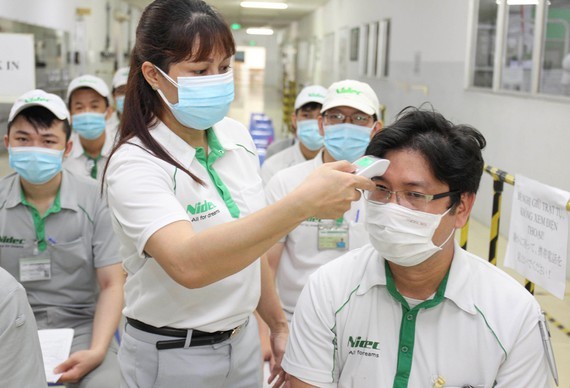
Chairman of HCMC Export Processing and Industrial Zones Authority (HEPZA) Nguyen Van Be commented that it is now impossible for Vietnam to erase all Covid-19 cases, and thus suggesting the country to live along with this disease so that business activities can come back to the new normal state. After a long time following social distancing regulations, most enterprises in Vietnam are urgently seeking suitable and flexible loan resources to resume their operation.
Similarly, Chairwoman of HCMC Food and Foodstuff Association Ly Kim Chi stated that many businesses are now in need of diversified financial policies to restart production, trading.
The State Bank has issued many directions for commercial banks to consider reducing loan interest rates based on current loan outstanding balance, freezing or rescheduling debts for business, yet the real implementation is not at all consistent. For instance, Deputy General Director of Tan Nhat Huong Trading Co. Ltd said that the popular reduced loan rate is around 0.2-0.5 percent, much lower than the proposed 1 percent by the State Bank.
Another practical direction from the State Bank is the approval for commercial banks to adjust and raise the valuation limit of mortgaged assets for reputable enterprises that are able to recover their capital in the future. This helps to increase the value of working capital loan from 70 percent at present to 85 percent, while decreasing the urge to find more collateral.
Simultaneously, these banks should review the loan capital structure of short, medium, and long terms for manufacturing enterprises in this special period so that they can access more medium- and long-term capital than they do now.
Banks are also suggested to loosen conditions to freeze or reschedule debts, to reduce interest rates of old loans, to lend unsecured loans to businesses of industries facing extreme challenges due to the pandemic, and to offer loans to those investing in disease treatment facilities, medical equipment, and vaccine research.
Regarding the capital matter, President of HCMC Finance and Investment State-owned Co. Nguyen Ngoc Hoa shared that thanks to the Investment and Development Stimulus Fund, businesses can access loans of up to VND200 billion (approx. US$8.8 million) with preferential rates in order to upgrade their equipment, technologies, and manufacturing chains.
Despite harshness, the pandemic also provides a lucrative chance for companies to boost their digital commerce. This requires functional agencies to quickly establish suitable trading floors, introduce a transparent standard legal corridor to effectively control goods quality in online trading. These floors not only bring convenience to both sellers and buyers but also earn revenues from service fees, become a tool for functional agencies to better monitor tax declaration and payment of member businesses.
Chairman of HCMC Unions of Business Associations (HUBA) Chu Tien Dung proposed that the municipal authorities quickly deliver social security packages to workers so that they are confident to come back to work. Certain workers are in need of support to upgrade their professional skills or train new skills to apply for new job. More importantly, it is necessary to aid businesses to establish appropriate accommodation for their own employees.
Tourism companies hoped that functional agencies introduce specific support packages for them as nearly all of them have to temporarily cease their work for such a long time.
Ultimately, HCMC is recommended to improve its business investment environment while reducing overhead cost for companies via cutting electric bill, shipping fees, traffic-related fees.
Chairwoman Chi reported that over 60 percent of food processing companies are sited in HCMC, yet they obtain most materials from the Southwest and Central regions. If social distancing regulations are still strictly applied like they are now, it is impossible to resume operation.
One critical factor in the supply chain flow is logistics. It is suggested that shipping enterprises must be managed in a digital way, including vaccination and routine Covid-19 test monitoring, goods receipt and delivery route control, payment collection.
























